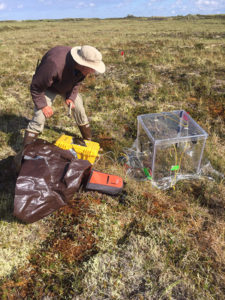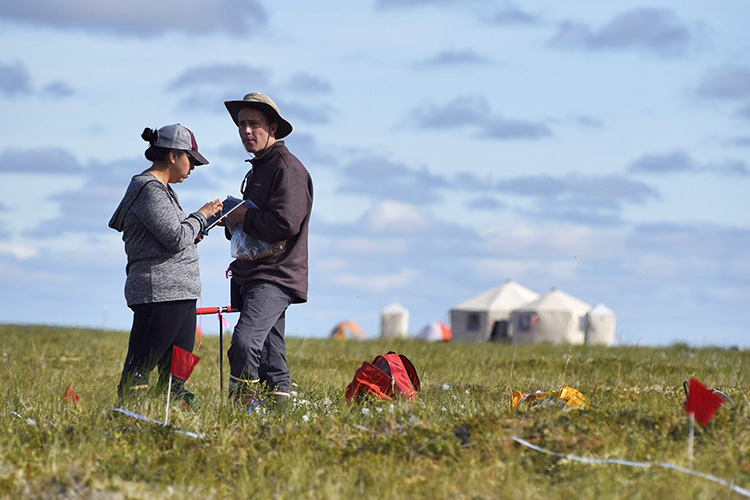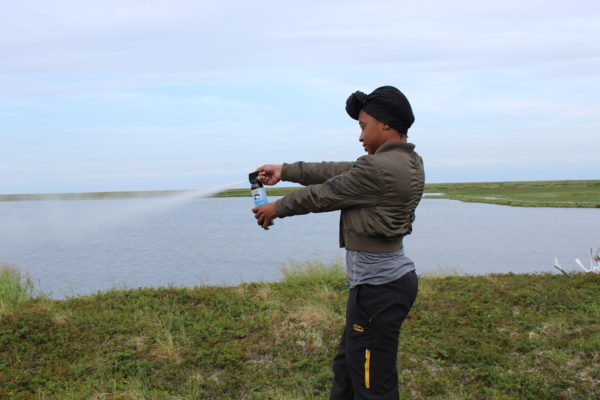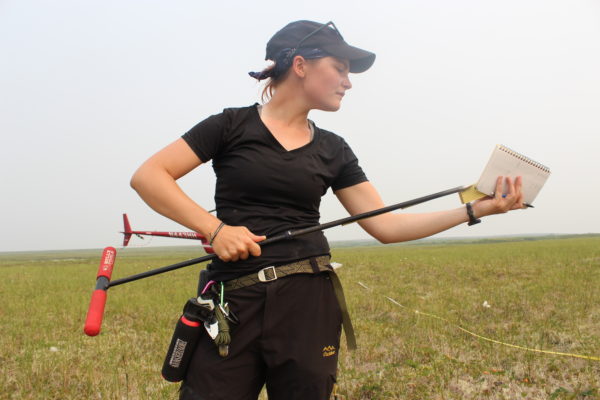The 2017 Polaris Project team spent two weeks studying climate change impact on the tundra of Alaska’s Yukon-Kusksokwim Delta. The team – including students and scientist faculty – returned to the Woods Hole Research Center on July 15 to process the samples they had taken in the field.
By Lukas Kerr
 My two-week stay in the Arctic tundra was extraordinary, I saw a bear, flew in a helicopter for the first time, learned a lot, and connected with the land around me.
My two-week stay in the Arctic tundra was extraordinary, I saw a bear, flew in a helicopter for the first time, learned a lot, and connected with the land around me.
For me, the journey really started when we flew into our study site by float plane and landed in a lake near camp. When I first stepped foot on the moss and lichen-covered landscape I tried to relate it to some other place I’ve been, but couldn’t. There’s really nothing else like it. I felt like I was like walking on an endless, wet carpet made of different shades of green and brown. Even now, only a few days later, I find it hard to imagine just how wet and squishy the whole place was. But, of course, it was much more than wet and squishy.
The mornings were my favorite time of day. They were usually cold and wet, but leaving my warm sleeping bag for the chilly, dew covered tundra always brought me face to face with the beauty of the landscape. There would be fog on the lake, birds flying overhead, and the arctic sun already high on the horizon. My daily routine was pretty simple: breakfast at 7:30AM, morning announcements from our camp manager Kevin, then off to the field.
The work I did in the field focused on characterizing vegetation at several sites and collecting relevant physical measurements nearby. I made transects across the tundra in areas with notable patterns of vegetation growth and estimated the prevalence of different species. Learning how to identify new plants was a fun challenge. I also measured NDVI (plant “greenness”) and CO2 uptake/release along the same transects at each site. I chose this research topic because it meant that I’d be able to learn a little bit more about what made the tundra so colorful and dynamic – the plants.
My work involved a lot of walking and carrying heavy instruments back and forth, but I loved being far away from camp and surrounded by nature. It made for a nice break from the crazy world we all live in most of the time. And of course, there was a bit of crazy out there too. Lots of planning and learning and data management contrasted nicely with the carefree nature of being in nature. Once my work in the field was completed, I enjoyed a hot meal and freshly baked desserts by Robin, the camp cook. After dinner, I often wrote notes from the day and relaxed by the lake with a good book and a cup of tea.
Being away from the outside world gave me the opportunity to be in the moment and think about what matters to me. Learning new techniques and pushing myself to work hard was invigorating, but I think my biggest takeaway from the whole experience was that I remembered how important nature is. I’m grateful to be part of a movement that understands the value of the natural world and strives to protect it.
Lukas Kerr is a rising senior at Ft. Lewis College in Durango, CO. He will receive his Bachelors of Science in Biology in 2018.




